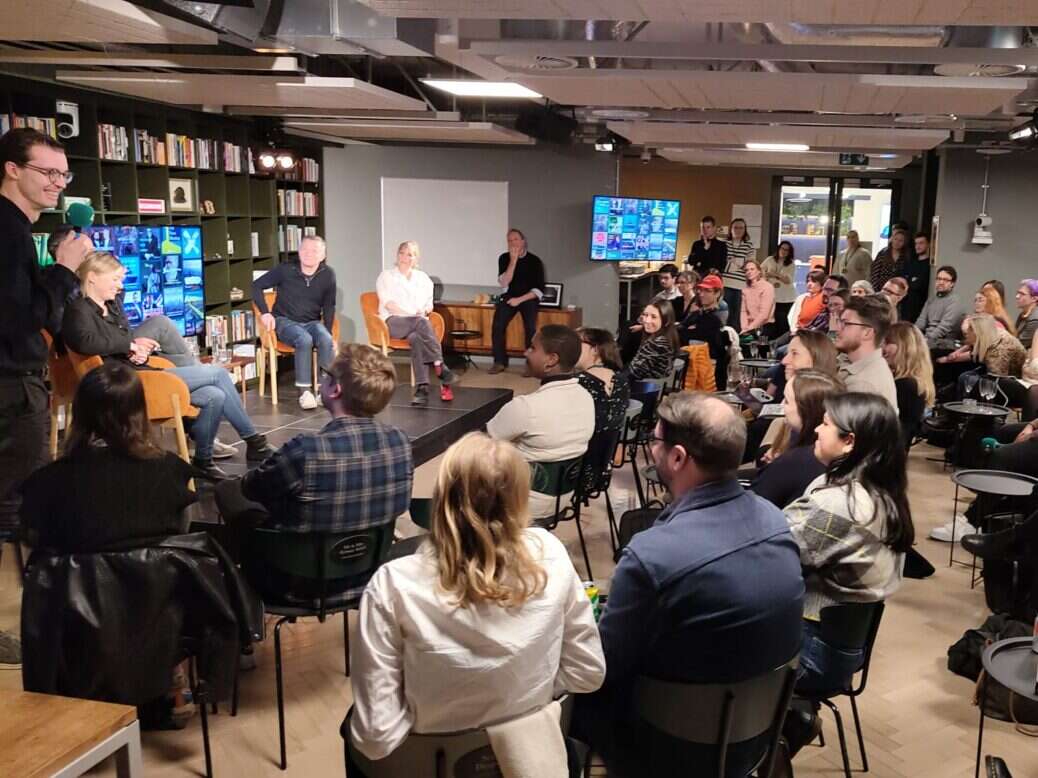
Tortoise Media‘s listenership has nearly doubled in a year, an executive at the “slow news” start-up has said.
Tortoise commercial director Alice Sandelson told an event at its office in London’s Berners Street on Thursday (pictured above) that listenership has grown 90% since the same time last year, not including the listenership from its viral hit Sweet Bobby.
Released in late 2021, Sweet Bobby is a multi-part investigation podcast that hunts down “one of the world’s most sophisticated catfishers”. Tortoise head of investigations Alexi Mostrous, who fronted the podcast, told the crowd the podcast has reached 11 million downloads and is set to air as a documentary on “a major streamer” later this year.
Press Gazette reported in October that Tortoise’s audio team had become profitable within its first 12 months of operation, although the business was still losing money overall. Tortoise won both the Growth and Innovation Award and Podcast of the Year Award (for Sweet Bobby) at Press Gazette’s inaugural Future of Media Awards last year.
Sandelson told the event, held to launch Tortoise’s podcast line-up for the next year: “I think we’ve been very lucky because that Sweet Bobby audience was a global one. We think it’s been listened to in every single country… and about 45% US listenership as well, which for a small newsroom in London has been great.
Sandelson said Tortoise has been able to redirect audiences from Sweet Bobby “around all of our different investigations as we launch them, and have done so with success – we now do have superfans writing in asking for the next investigation.
“And that means that we have retained a global audience. It’s pretty millennial, and it does skew female in the investigations (though things like Londongrad will get more male and older audiences).”
Majority-women news audiences remain relatively rare: for example, 2015 data showed the Daily Mail was the only major British newspaper to skew female.
Basia Cummings, who presents Tortoise’s weekly Slow Newscast, said: “One of the things that we’re really proud of is that it’s a slightly younger audience that skews female, which in the world of news and investigations is very unusual…
“I think newsrooms really struggle, particularly, with getting young women to engage, particularly around investigations. News is really seen as a men’s thing, boys’ thing, and lifestyle is for women.”
Asked how Tortoise had managed to cultivate that audience, Cummings said: “It could be that it has a female host, but maybe that would be a slightly simplistic explanation.
“I think we’ve thought really hard about how to make things feel accessible. And I think one of the reasons that we feel so strongly about narrative is that it opens up topics that otherwise might feel really difficult to get into.
“I mean, we recently tried to take on crypto – we were talking about whether that’s gone quite the way we want it to. But using those tools, thinking about character and sound design, and really breaking down complex stories into what people are going to care about, what’s gonna keep them coming – I think that forces you to think a bit more creatively and maybe open up stories in a way that other places don’t.”
Asked about how Tortoise monetises its work, former Today programme and Panorama editor Ceri Thomas, who is now editor of Tortoise Studios, said: “We don’t have to make money off all our podcasts. We want to make money, but we don’t have to make money with every single thing that we do.
[Read more: Tortoise’s Ceri Thomas on the future of podcasting – ‘It is the bedrock of everything we do’]
“We’re the only independent podcast maker in the country, with the exception of The Economist, that has a proper newsroom attached. And if you’re doing the stories that we’re doing, you’re not going to make money on… every single one. So we’re funded differently.
“We’re not like an IP factory, where you have to sort of take those deals in advance and put everything in place [so] that you know that every single thing you do is going to wash its face.
“A lot of what we do isn’t [able to wash its own face], but overall I think we can find the balance between doing the things that we want to do, that we think are important, and still at the end of the day making money out of that overall.”
Sandelson added: “I think we appreciate that lots of the content we do is harder to sponsor. I think that’s why we are thinking about how we can build habits, we know that that’s really important.
“And also recognise that there are lots of brands out there that want to get into the ears of Tortoise’s audience. Equally, when we have hits like Sweet Bobby, just the sheer reach is such a pull for brands. So I think between knowing the audience, knowing what they’d be interested in, and between the kind of reach play, we’re hoping that we’ll continue to make a success of it.”
Reflecting on Tortoise’s shift in emphasis from written to audio content, Thomas said: “I think the gamble was if you took audio as your platform, and narrative as your approach, was that a marriage that could deliver not just once in a while with those big ticket things like Sweet Bobby, but could it deliver every week, could it actually deliver every day?
“And I think what we’ve learned over the last year is basically that thing does work…
“I think to an extent we found our groove. Something that felt like a gamble 12 months ago now feels a bit more stable.”
[Read more: Podcasts among biggest UK media growth opportunities for 2023 – Yougov]
Email pged@pressgazette.co.uk to point out mistakes, provide story tips or send in a letter for publication on our "Letters Page" blog
